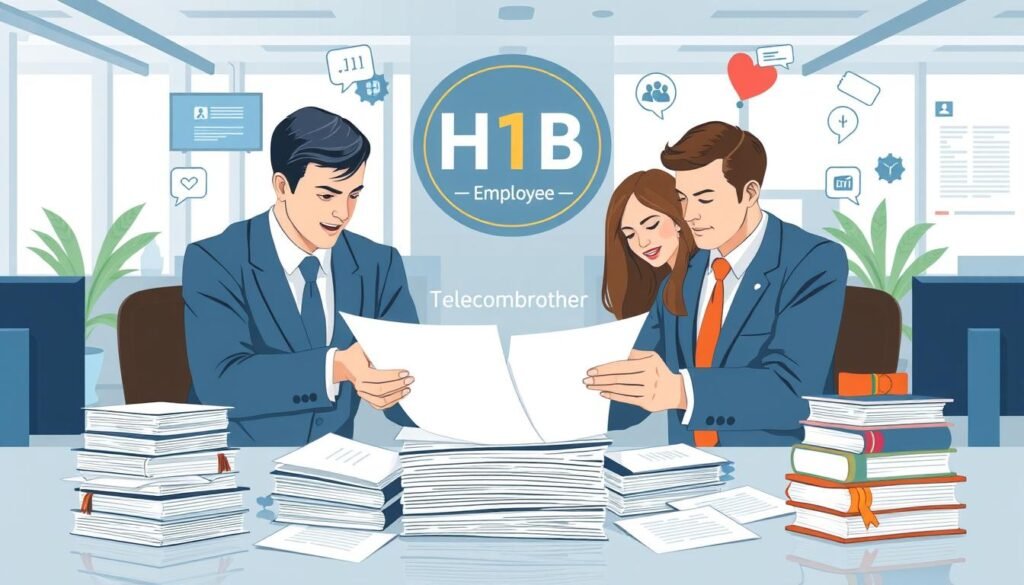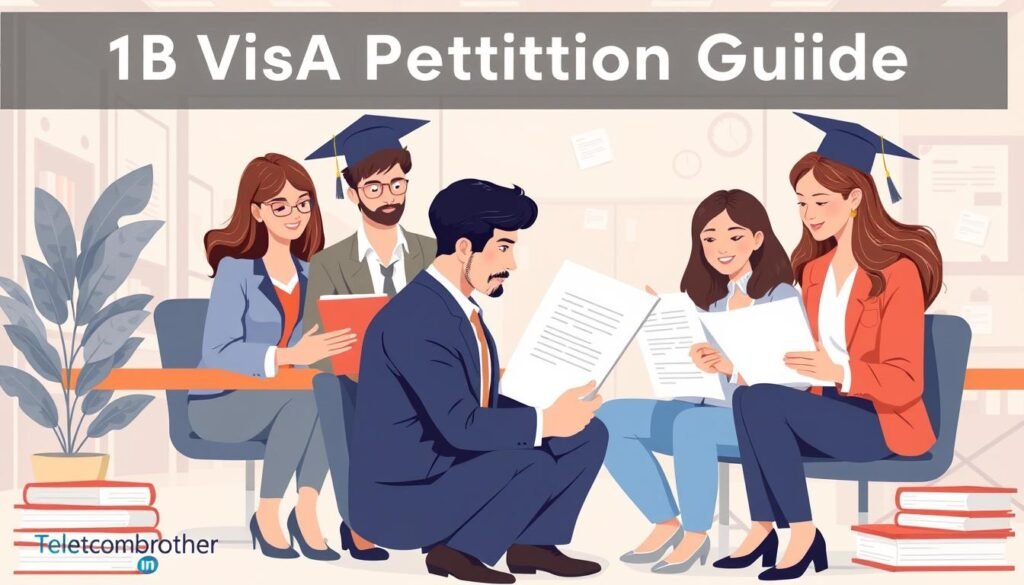Are you ready to tackle the complex world of H1B visa petitions without getting an RFE? Knowing how to handle H1B RFEs can be the key to getting your visa approved.
H1B RFEs have become more common, affecting a big part of H-1B petitions. USCIS is closely checking if jobs meet specialty occupation standards. It’s vital for applicants to know how to tackle these challenges.
Your H1B visa journey relies on showing you’re a perfect fit for the job. You need to prove your skills match the job’s needs. USCIS wants to see strong evidence that your qualifications are likely to meet their strict rules.
Key Takeaways
- Understand the critical importance of proving degree progression in H1B RFEs
- Recognize the increased scrutiny of specialty occupation documentation
- Prepare comprehensive evidence demonstrating your qualifications
- Learn how to effectively respond to USCIS requests
- Know the legal standard for establishing a specialty occupation
- Develop strategies to strengthen your H1B visa petition
Understanding the H1B RFE Process
Getting a visa can be tough for international workers wanting H1B visas. An H1B Request for Evidence (RFE) is a key message from the United States Citizenship and Immigration Services (USCIS). It asks for more documents to prove you meet immigration rules.
What is an H1B RFE?
An H1B RFE is a formal ask from USCIS for more info or to clear up parts of your visa application. It happens when officials need more evidence to decide. Getting an RFE doesn’t mean your application is doomed—it’s a chance to make your case stronger.
Why Do H1B RFEs Occur?
RFEs come from complex immigration laws. About 60% of H1B petitions get an RFE, but over 60% are approved after they respond.
- Questioning job position complexity
- Evaluating wage level appropriateness
- Verifying employer-employee relationship
- Confirming educational credentials
Common Reasons for H1B RFEs
Knowing why RFEs happen can help you prepare better. Key areas include:
| RFE Focus Area | Potential Issues |
|---|---|
| Educational Credentials | Proving four-year US bachelor’s degree equivalent |
| Job Specialization | Demonstrating position requires specialized knowledge |
| Status Maintenance | Providing recent pay stubs and work documentation |
“An RFE is not a roadblock, but a chance to provide clarity and strengthen your visa application.” – Immigration Expert
You usually have 60 days to answer an RFE, with no extensions. Being ready with detailed documents can really help your visa chances.
Importance of Degree Progression in H1B RFEs
Understanding degree progression is key to navigating H1B rules and meeting specialty occupation needs. Your academic background is crucial for your H1B application success.
When applying for an H1B visa, it’s vital to show how your education fits the job. The U.S. Citizenship and Immigration Services (USCIS) checks your academic credentials. They make sure they match the specialty occupation standards.
How Degree Progression Impacts Your Application
Degree progression is important in several ways for your H1B application:
- It shows you’re an expert in the specialty occupation
- It proves you’re qualified for the job
- It shows you have specialized knowledge
Proving Your Degree Progression
To prove your degree progression, collect detailed documents that show your educational journey:
- Official transcripts from all schools
- Detailed course syllabi showing relevant courses
- Academic credentials that clearly show progression
“A well-documented academic path can significantly strengthen your H1B application.” – USCIS Immigration Experts
Maintaining Relevant Documentation
Keeping accurate records is crucial for handling potential Requests for Evidence (RFEs). In fact, over 50% of H-1B petitions in the first three months of 2019 got an RFE from USCIS.
| Documentation Type | Importance |
|---|---|
| Academic Transcripts | Critical for proving educational qualifications |
| Degree Certificates | Validates specialty occupation requirements |
| Course Descriptions | Demonstrates relevance to job role |
Pro tip: Keep both digital and physical copies of all academic documents. This way, you’re ready for any H1B RFE challenges.
Strategies to Address H1B RFEs
Dealing with an H1B RFE can be tough, but the right steps can help. Knowing how to answer well is key for keeping your career on track.
When you get an H1B RFE, how you respond matters a lot. About 60% of these cases get approved, which is good news and a reason to do a thorough job.
Responding to an H1B RFE: Step-by-Step Guide
- Read the RFE carefully and know what’s needed
- Collect all the needed documents
- Write a detailed answer to each question
- Keep your documents in order
- Send your response back within 90 days
Key Elements of a Successful H1B RFE Response
Your answer should have:
- Expert opinion letters
- Detailed job descriptions
- Proof of your special skills
- Educational credential evaluations
| Response Element | Purpose | Recommended Documentation |
|---|---|---|
| Educational Equivalency | Prove your academic qualifications | Transcript, credential evaluation |
| Work Experience | Show your specialized skills | Employment verification letters |
| Position Complexity | Confirm your job’s specialty | Detailed job description |
Importance of Timely Responses to H1B RFEs
Time is of the essence when answering an H1B RFE. USCIS gives you 90 days to reply. If you miss this, your petition might be denied.
“Preparation and promptness are your strongest allies in the H1B RFE process.” – Immigration Law Expert
A good, detailed response boosts your chances of approval. It also shows you’re serious about following immigration rules.
Gathering Evidence for Your H1B RFE
Getting through H1B visa petitions needs careful documentation. The right documents can help your immigration law application succeed. Knowing what to gather is key for a good Labor Condition Application (LCA).

When facing an H1B Request for Evidence (RFE), collecting the right documents is crucial. Recent numbers show good news: the RFE rate fell to 9.8% in 2023, with a 97.2% approval rate.
Types of Documents to Collect for H1B RFEs
Your collection should have detailed documents proving your eligibility. Important items include:
- Academic transcripts and diplomas
- Employment verification letters
- Detailed job descriptions
- Professional certifications
- Project documentation
Organizing Evidence for Your H1B Application
Keeping your documents organized is essential. Put them in order and tell a clear story of your career. USCIS looks at if you’re “more likely than not” eligible based on your documents.
“The key to a successful H1B RFE response is presenting a comprehensive, well-organized set of documents that clearly establish your qualifications.”
Frequently Asked Questions About H1B RFE Evidence
When collecting evidence, keep these tips in mind:
- Always provide original documents when possible
- Include multiple forms of supporting documentation
- Ensure all documents are current and translated
- Verify that each document directly supports your H1B visa petition
The aim is to build a strong case showing your skills and H1B visa eligibility. With the right preparation and documents, your application’s success rate can improve a lot.
Additional Tips for a Successful H1B Application
Getting a H1B visa can be tough. Your success depends on good planning, expert advice, and knowing immigration rules.
Using professional networks and resources can really help your H1B application. It’s key to understand the H1B RFE rules for international workers wanting to work in the U.S.
Leveraging Professional Help for H1B RFEs
Working with a skilled immigration lawyer can greatly boost your application’s success. They can:
- Check if your documents are complete
- Spot any weak points in your application
- Give advice on how to answer RFEs
- Make sure you follow all immigration laws
Networking and Resources for H1B Applicants
Having a strong professional network can give you great insights into the H1B visa process. Here are some networking tips:
- Join online forums for immigration
- Go to seminars on immigration law
- Connect with people who have gone through the H1B process
- Be active in online communities about immigration
Staying Informed About H1B Regulations
H1B visa rules change often. It’s very important to stay up to date for successful immigration.
| Information Source | Reliability Rating | Update Frequency |
|---|---|---|
| USCIS Official Website | High | Weekly |
| Immigration Law Blogs | Medium | Daily |
| Professional Immigration Associations | High | Monthly |
“Knowledge is your most powerful tool in the H1B visa application process.” – Immigration Law Expert
About 30% of H1B applications get a Request for Evidence (RFE). Being proactive and getting expert help can really up your chances of getting your visa approved.
The Role of Employers in H1B RFEs
Employers and employees must work together to navigate H1B regulations. The relationship between them is key to a successful H1B petition. USCIS looks closely at how they work together.

What Employers Should Understand About H1B RFEs
Employers play a big role in H1B Request for Evidence (RFE) processes. They need to show a real employer-employee relationship and meet job requirements.
- Provide clear documentation of job responsibilities
- Maintain detailed employment agreements
- Demonstrate ongoing supervision and control
- Ensure compliance with Labor Condition Application (LCA) requirements
Collaborating with HR for Effective H1B Support
HR departments are crucial for preparing H1B petitions. They help gather and organize important documents. These documents prove the employer-employee relationship.
| Documentation Type | Purpose |
|---|---|
| Employment Contracts | Establish job terms and relationship |
| Performance Reviews | Demonstrate ongoing supervision |
| Work Assignments | Prove availability and specificity of work |
Strengthening Your H1B Case Through Employer Support
Employers can improve an H1B petition with detailed documentation. They need to show a genuine, controlled work environment. USCIS wants to see daily supervision, task allocation, and resource provision.
Successful H1B petitions are built on transparent, well-documented employer-employee relationships.
By knowing H1B regulations and addressing RFE concerns early, employers can support their international talent well.
Conclusion and Final Thoughts on H1B RFEs
Dealing with H1B RFEs can be tough, but the right steps can help a lot. Knowing about immigration rules and being methodical is key. Many people get their visas approved by being well-prepared and active in the process.
Your journey with H1B RFEs needs patience and smart planning. Now, many companies let applicants help with RFEs, which can boost success rates. Remember, the time it takes to process can vary, and you might keep working while waiting. Most people don’t give up on their applications, showing their dedication.
Your Path Forward
An RFE might seem scary, but it’s a chance to make your application stronger. Getting help from experts can really up your approval chances. If you’re denied, you can try again in 60 days. Use tools like the USCIS Case Progress Tracker and get professional advice to improve your RFE response.
Final Encouragement
Keep yourself updated, stay calm, and be confident in your H1B RFE journey. Your hard work, detailed documents, and knowledge of immigration laws will help a lot. Your career is important, and with the right strategy, you can overcome the H1B visa application challenges.


